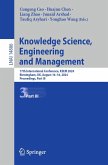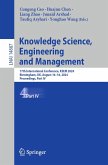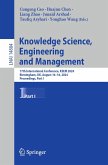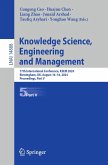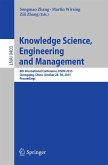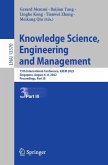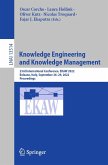Knowledge Science, Engineering and Management (eBook, PDF)
17th International Conference, KSEM 2024, Birmingham, UK, August 16-18, 2024, Proceedings, Part II
Redaktion: Cao, Cungeng; Wang, Yonghao; Asyhari, Taufiq; Arshad, Junaid; Zhao, Liang; Chen, Huajun


Alle Infos zum eBook verschenken

Knowledge Science, Engineering and Management (eBook, PDF)
17th International Conference, KSEM 2024, Birmingham, UK, August 16-18, 2024, Proceedings, Part II
Redaktion: Cao, Cungeng; Wang, Yonghao; Asyhari, Taufiq; Arshad, Junaid; Zhao, Liang; Chen, Huajun
- Format: PDF
- Merkliste
- Auf die Merkliste
- Bewerten Bewerten
- Teilen
- Produkt teilen
- Produkterinnerung
- Produkterinnerung

Hier können Sie sich einloggen

Bitte loggen Sie sich zunächst in Ihr Kundenkonto ein oder registrieren Sie sich bei bücher.de, um das eBook-Abo tolino select nutzen zu können.
The five-volume set LNCS 14884, 14885, 14886, 14887 & 14888 constitutes the refereed deadline proceedings of the 17th International Conference on Knowledge Science, Engineering and Management, KSEM 2024, held in Birmingham, UK, during August 16-18, 2024.
The 160 full papers presented in these proceedings were carefully reviewed and selected from 495 submissions. The papers are organized in the following topical sections:
Volume I: Knowledge Science with Learning and AI (KSLA)
Volume II: Knowledge Engineering Research and Applications (KERA)
Volume III: Knowledge Management with…mehr
- Geräte: PC
- ohne Kopierschutz
- eBook Hilfe
- Größe: 28.64MB
![Knowledge Science, Engineering and Management (eBook, PDF) Knowledge Science, Engineering and Management (eBook, PDF)]() Knowledge Science, Engineering and Management (eBook, PDF)186,95 €
Knowledge Science, Engineering and Management (eBook, PDF)186,95 €![Knowledge Science, Engineering and Management (eBook, PDF) Knowledge Science, Engineering and Management (eBook, PDF)]() Knowledge Science, Engineering and Management (eBook, PDF)121,95 €
Knowledge Science, Engineering and Management (eBook, PDF)121,95 €![Knowledge Science, Engineering and Management (eBook, PDF) Knowledge Science, Engineering and Management (eBook, PDF)]() Knowledge Science, Engineering and Management (eBook, PDF)186,95 €
Knowledge Science, Engineering and Management (eBook, PDF)186,95 €![Knowledge Science, Engineering and Management (eBook, PDF) Knowledge Science, Engineering and Management (eBook, PDF)]() Knowledge Science, Engineering and Management (eBook, PDF)121,95 €
Knowledge Science, Engineering and Management (eBook, PDF)121,95 €![Knowledge Science, Engineering and Management (eBook, PDF) Knowledge Science, Engineering and Management (eBook, PDF)]() Knowledge Science, Engineering and Management (eBook, PDF)40,95 €
Knowledge Science, Engineering and Management (eBook, PDF)40,95 €![Knowledge Science, Engineering and Management (eBook, PDF) Knowledge Science, Engineering and Management (eBook, PDF)]() Knowledge Science, Engineering and Management (eBook, PDF)89,95 €
Knowledge Science, Engineering and Management (eBook, PDF)89,95 €![Knowledge Engineering and Knowledge Management (eBook, PDF) Knowledge Engineering and Knowledge Management (eBook, PDF)]() Knowledge Engineering and Knowledge Management (eBook, PDF)32,95 €
Knowledge Engineering and Knowledge Management (eBook, PDF)32,95 €-
-
-
The 160 full papers presented in these proceedings were carefully reviewed and selected from 495 submissions. The papers are organized in the following topical sections:
Volume I: Knowledge Science with Learning and AI (KSLA)
Volume II: Knowledge Engineering Research and Applications (KERA)
Volume III: Knowledge Management with Optimization and Security (KMOS)
Volume IV: Emerging Technology
Volume V: Special Tracks
Dieser Download kann aus rechtlichen Gründen nur mit Rechnungsadresse in A, B, BG, CY, CZ, D, DK, EW, E, FIN, F, GR, HR, H, IRL, I, LT, L, LR, M, NL, PL, P, R, S, SLO, SK ausgeliefert werden.
- Produktdetails
- Verlag: Springer Nature Singapore
- Seitenzahl: 464
- Erscheinungstermin: 25. Juli 2024
- Englisch
- ISBN-13: 9789819754953
- Artikelnr.: 72240705
- Verlag: Springer Nature Singapore
- Seitenzahl: 464
- Erscheinungstermin: 25. Juli 2024
- Englisch
- ISBN-13: 9789819754953
- Artikelnr.: 72240705
- Herstellerkennzeichnung Die Herstellerinformationen sind derzeit nicht verfügbar.
.- Research on Node Cluster Analysis in Brain Connection Data.
.- A New Emotion Classification Method Based on JAN-VMD.
.- Neuro-Genetic System: A Hybrid System of CNN-BiLSTM Optimized by Genetic Algorithm for Road Accident Severity Prediction.
.- MoveFormer: Spatial Graph Periodic Injection Network for Next POI Recommendation.
.- Bio-Inspired Feature Selection via An Improved Binary Golden Jackal Optimization Algorithm.
.- Dynamic Reliability-optimised and Energy-efficient Scheduling Algorithms in Heterogeneous Multi-core Systems.
.- A Human-Computer Negotiation Model Based on Sentiment Analysis and Big Data.
.- A novel online sequential learning algorithm for ELM based on optimal control.
.- DICES: Diffusion-Based Contrastive Learning with Knowledge Graphs for Recommendation.
.- Variational Loss of Random Sampling for Searching Cluster Number.
.- DVDNER: Dual-view Learning Named Entity Recognition via Diffusion.
.- Achieving Universal Fairness in Machine Learning: A Multi-objective Optimization Perspective.
.- SSNF: Optimizing Entity Alignment with a Novel Structural and Semantic Neighbor Filtering.
.- Visual Analytics of Learning Behavior Based on the Dendritic Neuron Model.
.- Feature Matching Based Heterogeneous Transfer Learn-ing for Student Performance Prediction.
.- Weighted Multiple Source-Free Domain Adaptation Ensemble Network in Intelligent Machinery Fault Diagnosis.
.- Logarithm of Maximum Posterior Evidence: Advanced Model Selection for Text Classification.
.- A Hybrid Method Combing Reinforcement Learning and Heuristics in Solving Two-Echelon Vehicle Routing Problem with Backhauls.
.- AgriBERT: A Joint Entity Relation Extraction Model Based on Agricultural Text.
.- Research on Key Node Cluster Identification Algorithm based on Louvain and Cycle Ratio.
.- Uncertain $k$ center Clustering, Revisited: Point Assignment.
.- DPSPC: A Density Peak-based Statistical Parallel Clustering Algorithm for Big Data.
.- Insert Commonsense Knowledge through Semantics for Dialogue Generation.
.- Entity Set Expansion based on Category Prompts in MOOCs.
.- ViT Hybrid Channel Fit Pruning Algorithm for Co-Optimization of Hardware and Software for Edge Device.
.- Collaborative Adversarial Learning for Unsupervised Federated Domain Adaptation.
.- Improving Image Captioning with Image Concepts of Words.
.- M HGN: Multi information Enhanced Heterogeneous Graph Network for Multi-party Dialogue Reading Comprehension.
.- A Student Performance Prediction Model Based on Feature Factor Transfer.
.- A Binary Multi-objective Grey Wolf Optimization for Feature Selection.
.- CS Net: A Coarse-to-fine-grained Summarization Network for Community-based Question Answering Summarization.
.- AutoIE: An Automated Framework for Information Extraction from Scientific Literature.
.- Adaptive Density Peak Clustering with Optimized Border-peeling.
.- Efficient Affinity Propagation Clustering Based on Szemer´edi's Regularity Lemma.
.- Research on Node Cluster Analysis in Brain Connection Data.
.- A New Emotion Classification Method Based on JAN-VMD.
.- Neuro-Genetic System: A Hybrid System of CNN-BiLSTM Optimized by Genetic Algorithm for Road Accident Severity Prediction.
.- MoveFormer: Spatial Graph Periodic Injection Network for Next POI Recommendation.
.- Bio-Inspired Feature Selection via An Improved Binary Golden Jackal Optimization Algorithm.
.- Dynamic Reliability-optimised and Energy-efficient Scheduling Algorithms in Heterogeneous Multi-core Systems.
.- A Human-Computer Negotiation Model Based on Sentiment Analysis and Big Data.
.- A novel online sequential learning algorithm for ELM based on optimal control.
.- DICES: Diffusion-Based Contrastive Learning with Knowledge Graphs for Recommendation.
.- Variational Loss of Random Sampling for Searching Cluster Number.
.- DVDNER: Dual-view Learning Named Entity Recognition via Diffusion.
.- Achieving Universal Fairness in Machine Learning: A Multi-objective Optimization Perspective.
.- SSNF: Optimizing Entity Alignment with a Novel Structural and Semantic Neighbor Filtering.
.- Visual Analytics of Learning Behavior Based on the Dendritic Neuron Model.
.- Feature Matching Based Heterogeneous Transfer Learn-ing for Student Performance Prediction.
.- Weighted Multiple Source-Free Domain Adaptation Ensemble Network in Intelligent Machinery Fault Diagnosis.
.- Logarithm of Maximum Posterior Evidence: Advanced Model Selection for Text Classification.
.- A Hybrid Method Combing Reinforcement Learning and Heuristics in Solving Two-Echelon Vehicle Routing Problem with Backhauls.
.- AgriBERT: A Joint Entity Relation Extraction Model Based on Agricultural Text.
.- Research on Key Node Cluster Identification Algorithm based on Louvain and Cycle Ratio.
.- Uncertain $k$ center Clustering, Revisited: Point Assignment.
.- DPSPC: A Density Peak-based Statistical Parallel Clustering Algorithm for Big Data.
.- Insert Commonsense Knowledge through Semantics for Dialogue Generation.
.- Entity Set Expansion based on Category Prompts in MOOCs.
.- ViT Hybrid Channel Fit Pruning Algorithm for Co-Optimization of Hardware and Software for Edge Device.
.- Collaborative Adversarial Learning for Unsupervised Federated Domain Adaptation.
.- Improving Image Captioning with Image Concepts of Words.
.- M HGN: Multi information Enhanced Heterogeneous Graph Network for Multi-party Dialogue Reading Comprehension.
.- A Student Performance Prediction Model Based on Feature Factor Transfer.
.- A Binary Multi-objective Grey Wolf Optimization for Feature Selection.
.- CS Net: A Coarse-to-fine-grained Summarization Network for Community-based Question Answering Summarization.
.- AutoIE: An Automated Framework for Information Extraction from Scientific Literature.
.- Adaptive Density Peak Clustering with Optimized Border-peeling.
.- Efficient Affinity Propagation Clustering Based on Szemer´edi's Regularity Lemma.

